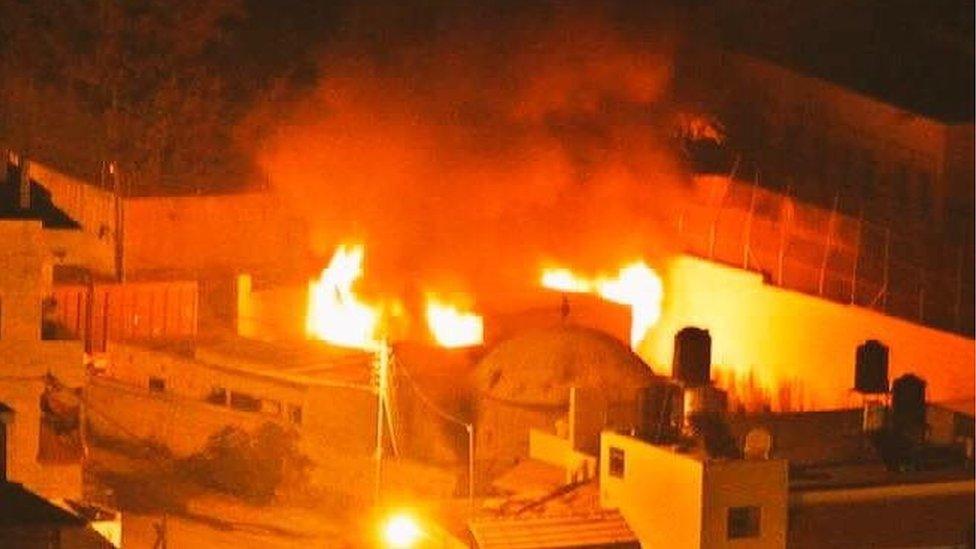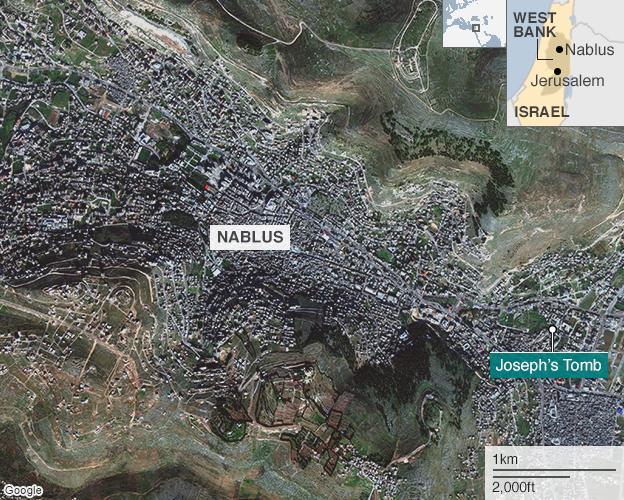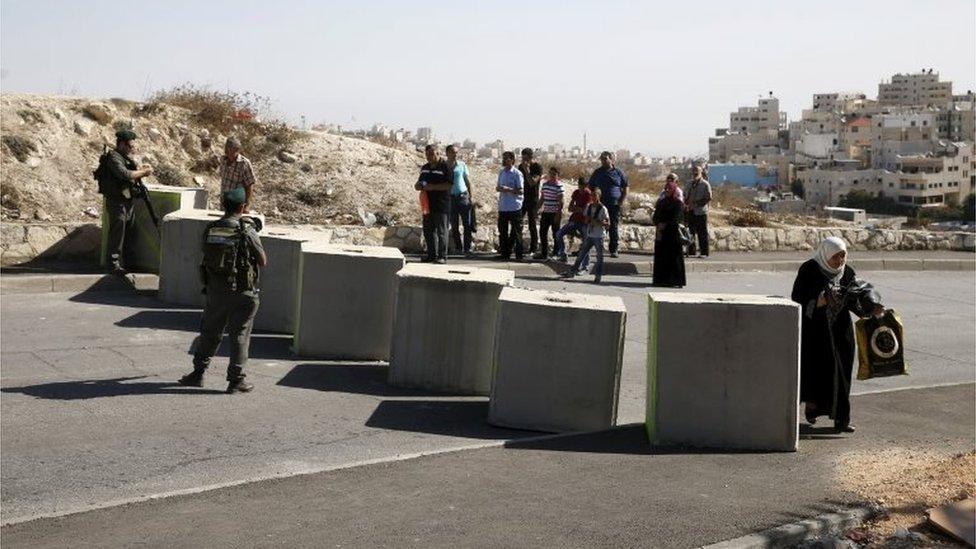Palestinian rioters torch Jewish holy site Joseph's Tomb
- Published

Joseph's Tomb was badly damaged in the blaze
Palestinians have torched a Jewish holy site in the West Bank city of Nablus, amid soaring tensions with Israel.
Rioters set fire to a tomb revered as that of the biblical figure Joseph. The site, where Jews go to pray, was badly damaged.
It came hours after Israeli PM Benjamin Netanyahu called on the Palestinian leadership to stop a wave of attacks.
Palestinian leader Mahmoud Abbas condemned the arson and said the site would be repaired.
Elsewhere in the occupied West Bank, a Palestinian disguised as a news photographer stabbed and moderately wounded an Israeli soldier, the Israeli military said.
It said the Palestinian attacker was shot dead in the incident in the Jewish settlement of Kiryat Arba, next to Hebron.
A Palestinian man wearing a yellow vest with the word Press written on it stabbed and wounded an Israeli soldier near Hebron
Violence between the two sides has spiralled, with near-daily stabbings by Palestinians of Israelis this month.
Seven Israelis have been killed and dozens wounded in the stabbings and some gun attacks. At least 30 Palestinians, including several of the attackers, have been killed in the growing unrest.
The upsurge began last month when tensions at a flashpoint holy site in Jerusalem revered by Jews and Muslims boiled over amid rumours Israel planned to relax long-standing rules to increase Jewish rights at the complex. Israel has repeatedly denied such claims.


Joseph's Tomb
Revered by Jews and Muslims as the burial place of the biblical figure Joseph, son of Jacob
Located in a compound in the city of Nablus, transferred to Palestinian control in 1995
Ransacked and burnt by Palestinian rioters at start of second uprising in Oct, 2000
Jewish pilgrims permitted to visit at night, once a month, under Israeli military protection
Visits co-ordinated with Palestinian authorities

'Blatant violation'
In the night-time attack in Nablus, dozens of Palestinians overran the tomb, attacking it with petrol bombs.
Palestinian police dispersed the crowd and firefighters extinguished the blaze before Israeli security forces arrived.
Israel's military spokesman Lt Col Peter Lerner said the attack, external was "a blatant violation of the basic value of freedom of worship".
He said Israel would "bring perpetrators to justice and restore the site".
PLO executive committee member Hanan Ashrawi accused Israel of "killing Palestinians with impunity"
Micky Rosenfeld of the Israeli police says the situation in Jerusalem is "relatively tense"
Mahmoud Abbas denounced the attack on the tomb as "illegal", adding that it "offends our culture and our religion and our values".
This is not the first time the tomb has come under attack. Palestinians tried to set fire to it again last year and virtually destroyed the site in 2000 after Israeli guards withdrew amid clashes.
It comes amid a major security operation by Israel to try to stop attacks on its citizens by Palestinians.
Roadblocks have been set up in Palestinian areas of East Jerusalem, where many of the attackers have come from, and hundreds of extra troops will be deployed on the streets on Sunday.

Israel has set up roadblocks in East Jerusalem to try to stop further attacks
Hours before the attack in Nablus, Mr Netanyahu called on Palestinian Authority President Mahmoud Abbas to stop what he said was incitement to violence.
Mr Abbas has said Israeli occupation of Palestinian areas and "aggression" is to blame for the unrest.
Meanwhile the UN Security Council is to hold an emergency meeting on Friday to discuss the upsurge of violence.
The US Secretary of State John Kerry has said he planned to travel to the region in the next few days, amid reports that a meeting may take place in Jordan to include the Israeli and Palestinian leaders.

Are you in Nablus? Have you been affected by the issues in this story? You can share your comments and experience by emailing haveyoursay@bbc.co.uk, external.
Please include a contact number if you are willing to speak to a BBC journalist. You can also contact us in the following ways:
WhatsApp: +44 7525 900971
Send pictures/video to yourpics@bbc.co.uk, external
Tweet: @BBC_HaveYourSay, external
Send an SMS or MMS to +44 7624 800 100